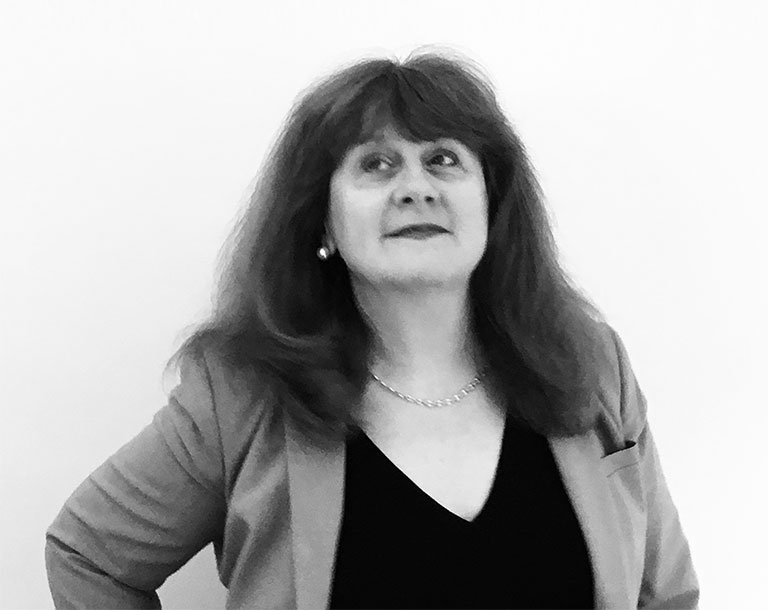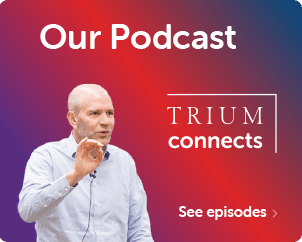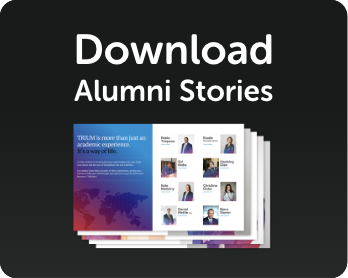

Marie-Josee Rodi-Andrieu
Marie-Josee Rodi-Andrieu
Chief Business Officer & Senior Advisor of International Development, All You Need For Growth
(TRIUM Class of 2008)
“Hitting my goals, having a well-balanced life, being reliable and adding to society: these are for me proofs of success.”
“I am ambitious and curious also but above all, very impatient,” says Marie-Josee Rodi-Anrieu. “I always need stimulation.”
These characteristics—as well as a desire for a career abroad and a more global view on business—motivated Marie-Josee to pursue her EMBA nearly 15 years ago. Her career originated in sales in the ICT sector and progressed to consulting, marketing, then to the C-Suite with responsibilities that spanned the globe, including in France, Spain, Italy, Portugal, and Greece.
She initially considered other EMBA programs, but TRIUM struck her as the only truly international program with a curriculum tailored to C-Suite executives, which spoke to two of her main priorities.
Today, over a decade after graduation, Marie-Josee is Chief Business Development Officer and Senior Advisor of International Development for All You Need for Growth, which provides legal and financial advice to ambitious entrepreneurs and C-Level executives worldwide. She also assists Governments and NGOs to promote their offering in France, in order to attract French companies to set up in the United States. Passionate about entrepreneurship, Marie-Josee also mentors French startups, assisting them in business development and fundraising questions.
Marie-Josee recently caught up with TRIUM on how the program continues to shape her successes, the challenges and opportunities for women in international leadership positions, and how the cultural diversity of her cohort gave her the experience she needed to prepare for a global career.
Your career has spanned the globe—from Western Europe to Norway to the United States. Can you speak to the importance of global learning and programs like TRIUM that expose students to different business environments and cultures, explore geo-political issues, and curate a diverse cohort?
TRIUM was very beneficial because it exposed me to cultures that I was less familiar with, especially Asia and the Middle East.
My 2008 cohort was so diverse—comprised of 30 different nationalities—and it was a real challenge to learn how to work together. That’s what I appreciated the most: learning how to overcome differences of communication and behaviour. Many members of my cohort have become friends and we are still in touch after all these years. I know we can rely on each other.
You have worked in both private organizations and are also an active advisor to government agencies, NGOs and leaders. How did the curriculum and expertise from TRIUM allowed you to be nimble to work across private/public sectors?
When I graduated from TRIIUM in 2008, we were amid a big economic crisis. I wanted to work for a multinational company, but it was the public sector that came up. TRIUM was an advantage because the global vision that had been given to me allowed me to take a position at the French Ministry of Foreign Trade and to deal with geo-political topics. Then the NYU Stern label was an advantage, as I was recruited to lead SelectUSA, the U.S. federal government agency promoting Foreign Direct Investment in the United States.
What has your experience been as a woman in senior leadership positions?
Things are changing but there is still a “glass ceiling.” I have belonged to many women’s organizations like European Professional Business Network, HEC for Women, and Women in Tech, that work for more gender equality. But I think it’s your skills and your personality that helps you build your leadership. It is more difficult to assert yourself as a woman leader in some countries, including France, where I am based. Competence and a strong network become more crucial.
What are the challenges facing women in executive leadership roles? How do you overcome these challenges?
Women leaders must demonstrate emotional stability, strength, courage, and natural authority while maintaining our femininity. We have to be inspiring and demonstrate being “an iron fist in a velvet glove.”
I have succeeded in overcoming these challenges by example: showing resilience and inspiring respect. Sometimes this arouses jealousy, but it is part of the role, and we have to accept it.
Women must dare and trust themselves: we have all the qualities to succeed: energy, tenacity, resilience, but we are sometimes too humble.
It has been more than a decade since you graduated. What return on investment has TRIUM had on your career over the years?
TRIUM offered me a challenge to take on and a shortcut to success.
It is a very demanding program and I learned to be efficient and very well organized.
This has impacted my life and the way I approach work: I learned to have a “helicopter view,” avoid details, save time, prioritize actions, and work fast. The program allowed me to become an agile and creative leader.
Beyond the richness of the program, I have created strong links with my peers in the cohorts of 2008, 2009 and beyond. Having such a strong network is fundamental to building a career. And since I am a networker, I have also been very involved with HEC business school, participating in many events. These links that I have been able to create are an invaluable return on investment.
Are there specifics from the program—either advice from professors or peers, or information from in-class learning—that have stuck with you through the years and has stood the test of time?
Two personalities have marked me: Marc Bertonèche and Aswath Damodaran. The humour that both of them displayed during the lessons, allowed me to assimilate difficult concepts. And that’s what I’ve learned: humour relaxes difficult situations. Technicality is not enough.
How did TRIUM shape your idea of success?
What is success? Is it wealth, happiness, fame? Success has to be defined on your own terms. For me, success is setting concrete goals, always doing our best; it is learning that losing a few battles can help you win a war. Success is also not giving up. Never.
And any measure of “success” cannot be one dimensional. There are many metrics, but if a person looks only at those that directly affect them, then they lack a complete measurement. It is good to succeed in business, but it is important to succeed in life. Hitting my goals, having a well-balanced life, being reliable and adding to society: these are for me proofs of success.
What advice do you have for women considering the TRIUM EMBA?
Women considering the TRIUM EMBA must do it with a specific objective to get the best out of it. You must have a strategy and build an action plan. After all, it’s like starting a business for yourself.
How would you describe your TRIUM experience in three words?
Amazing. Inspiring. Daring.






